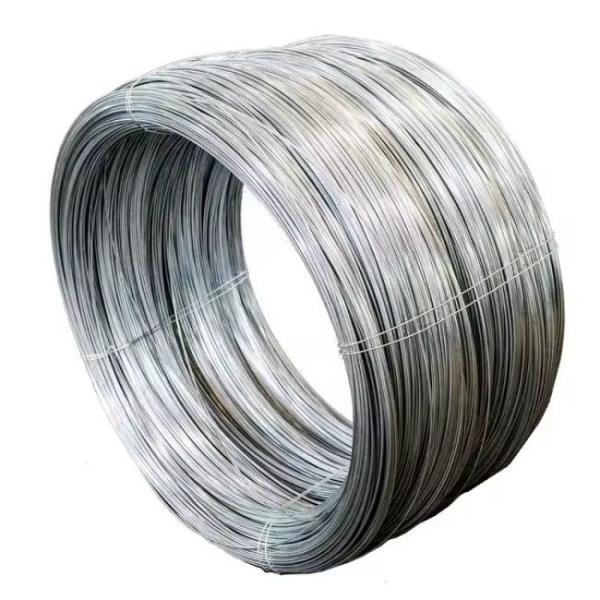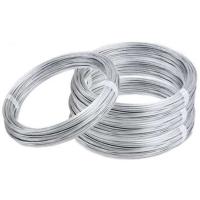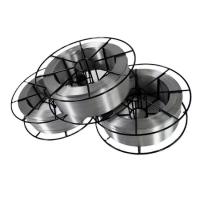| Sign In | Join Free | My himfr.com |
|
| Sign In | Join Free | My himfr.com |
|
| Ask Lasest Price | |
| Brand Name : | DINGSCO |
| Model Number : | According to customers' requirements |
| Certification : | ISO 9001:2015,PED 2014/68/EU,API 6A,API-20B,TSG,NORSOK |
| Price : | Negotiable |
| Payment Terms : | T/T |
| Supply Ability : | Negotiable |
| Delivery Time : | (Sample order) 7 days |
Inconel 625 600 601 718 X750 Nickel Alloy Wire Welding Wire N06625 2.4856 Alloy 625 Monel 400
Nickel alloy wire possesses a combination of unique properties, including excellent corrosion resistance, high heat resistance, considerable electrical conductivity, and strong magnetic properties, depending on the specific alloy. These properties enable its use across a broad spectrum of applications, spanning various industries. Some of the main application areas of nickel alloy wire include:
Aerospace Industry
Nickel alloy wires are utilized in manufacturing parts for aircraft
and spacecraft due to their ability to withstand extreme
temperatures and corrosive environments. Components like engine
parts, exhaust systems, and turbine blades benefit from the
high-temperature strength and oxidation resistance of nickel
alloys.
Electrical and Electronics Industry
Due to their good conductivity, specific nickel alloys are used in
electronic components. Nickel alloy wires can be found in
resistors, capacitors, and battery connections. They are also used
in lead wires for heating elements and as a core material in cables
that require high performance under adverse conditions.
Automotive Industry
In the automotive sector, nickel alloy wires are used for
components that need to resist corrosion and operate reliably over
a wide range of temperatures. Examples include spark plug wires,
electrical connectors, and sensor components. The high-performance
characteristics of nickel alloys aid in extending the life and
efficiency of automotive parts.
Energy Sector
Nickel alloys play a crucial role in both traditional and renewable
energy sectors, including oil and gas, nuclear power, and wind
turbines. Their corrosion resistance is vital for components
exposed to harsh environments, such as downhole wiring in oil and
gas extraction and high-temperature parts in nuclear reactors. In
renewable energy systems, such as wind turbines, nickel alloy wires
are used in electrical connections that require durability and
reliability.
Medical Devices
The biocompatibility of certain nickel alloys makes them suitable
for medical devices. Nickel titanium alloy wires, for example, are
used in orthodontics for braces and in stents for cardiovascular
applications. These alloys can return to their original shape after
deformation, a property that's highly valued in medical devices
requiring precision and flexibility.
Chemical Processing Industry
Nickel alloy wires are used in environments with corrosive
chemicals. They are ideal for sensors, heating elements, and
control devices within chemical reactors and processing equipment.
Their corrosion resistance ensures durability and reliable
performance in aggressive chemical exposures.
Consumer Goods
Nickel alloy wires are also found in consumer goods, such as
appliances, where their resistance to oxidation and corrosion at
high temperatures is crucial. Elements in toasters, ovens, and
electric kettles often utilize nickel alloy wires for their heating
properties and longevity.
Marine Applications
The maritime environment poses a significant corrosion challenge,
and nickel alloy wires are used in various marine applications,
such as sensors and control devices, to withstand these conditions.
They offer excellent resistance to saltwater corrosion, extending
the life of marine equipment.
Magnetic Applications
Certain nickel alloys with magnetic properties are used in
electronic components and devices requiring specific magnetic
characteristics, such as transformers, inductors, and shielding
materials for electromagnetic interference (EMI).
In sum, nickel alloy wires are indispensable in industries that
demand materials capable of performing under extreme conditions,
such as high temperatures, corrosive environments, and where
superior mechanical and magnetic properties are required. Their
versatility and performance characteristics make them a go-to
choice for many critical applications.
The following table lists only some of the grades:
| Grade | UNS | DIN |
| Monel 400 | N04400 | W.Nr. 2.4360 |
| Monel K-500 | N05500 | W.Nr. 2.4375 |
| Inconel 625 | N06625 | W.Nr. 2.4856 |
| Inconel 718 | N07718 | W.Nr. 2.4668 |
| Inconel X-750 | N07750 | W. Nr. 2.4669 |
| Inconel 600 | N06600 | W.Nr. 2.4816 |
| Inconel 601 | N06601 | W.Nr. 2.4851 |
| Incoloy 825 | N08825 | W.Nr. 2.4858 |
| Incoloy A-286 | S66286 | W.Nr.1.4980 |
| Hastelloy C-276 | N10276 | W.Nr.2.4819 |
| Hastelloy C-22 | N06022 | W.Nr.2.4602 |
| Hastelloy C-4 | N06455 | W.Nr.2.4610 |
| Hastelloy B-3 | N10675 | W.Nr.2.4600 |
| Hastelloy X | N06002 | W.Nr.2.4665 |
| Hastelloy B-2 | N10665 | W.Nr.2.4617 |


|




